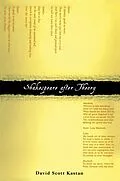The most familiar assertion of Shakespeare scholarship is that he is our contemporary. Shakespeare After Theory provocatively argues that he is not, but what value he has for us must at least begin with a recognition of his distance from us.
Autorentext
David Scott Kastan is Professor of English and Comparative Literature at Columbia University. Among his publications are Shakespeare and the Shapes of Time, Staging the Renaissance (ed. with Peter Stallybrass), Critical Essays on Shakespeare's Hamlet, and The New History of Early English Drama (ed. with John Cox). He is also a general editor of the Arden Shakespeare.
Inhalt
Part 1 Introduction; Introduction; Part 2 Demanding History; Chapter 1 Shakespeare after Theory; Chapter 2 Are We Being Interdisciplinary Yet?; Part 3 The Text in History; Chapter 3 The Mechanics of Culture; Chapter 4 Shakespeare in Print; Chapter 5 "Killed with Hard Opinions"; Part 4 The Text as History; Chapter 6 "Proud Majesty Made a Subject"; Chapter 7 "The King hath many marching in his Coats," or, What did you do in the War, Daddy?; Chapter 8 Is There a Class in This (Shakespearean) Text?; Chapter 9 Macbeth and the "Name of King"; Chapter 10 "The Duke of Milan / And his Brave Son"; Part 5 Coda; Chapter 11 "Publike Sports" and "Publike Calamities";
